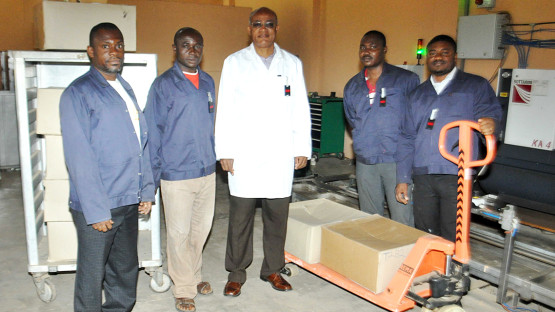Infections acquired from improperly sterilized equipment are recognized as a major impediment to safe health care delivery, with consequences that are often deadly for patients. Radiation technology plays a major role in many countries in making medical equipment safer – and will be one of the topics discussed at this year’s Scientific Forum in Vienna 15-16 September. “The use of nuclear applications, such as exposing medical items to gamma radiation, helps Ghana protect its people from avoidable sicknesses that can occur if items like syringes are not properly sterilized,” said Abraham Adu-Gyamfi, Manager of the Radiation Technology Centre of the Ghana Atomic Energy Commission’s Biotechnology and Nuclear Agriculture Research Institute in Accra, the capital city.
“Our country recognized the immense potential and usefulness of the technology of radiation processing for development in a number of fields, including in the medical sector to enhance health care. That is why Ghana was eager to have such technology available,” Adu-Gyamfi said. Radiation technology [see box] has improved the hygienic quality of medical items, he explained, particularly items made of plastics, which are difficult to sterilize with heat and other conventional methods.
Short exposure eliminates viruses and bacteria
Ghana is among the African countries that, with the support of the IAEA, works to improve its health care systems by ensuring safe medical supplies using modern nuclear science and technology, said Sunil Sabharwal, a radiation processing specialist at the IAEA. Gamma radiation plays a crucial role in providing sterilized packaged medical items quickly, effectively and affordably, he said.
Sterilization aims to reduce the presence of microorganisms, such as fungi, bacteria, viruses and other potential pathogens. High energy radiation has come to be recognized as the most effective method of sterilizing medical items, said Sabharwal. It is a "clean and efficient process" as it does not leave any residue on the device after treatment. The gamma rays can penetrate all parts of the material uniformly, even in closed package products, with minimal temperature rise, he said, and the items can be used instantly following sterilization, without any quarantine period.
Improving the hygienic quality of medical items using gamma radiation
The Ghana Atomic Energy Commission (GAEC) provides irradiation services to 15 hospitals/clinics and 4 companies using a cobalt-60 (60Co) irradiator. Irradiated items include:
- single-use medical items such as gauze, syringes, cotton wool, sutures, syringe needles;
- catheters, infusion sets and fluids;
- surgical clothing (gowns, caps, footwear) and sheets;
- tissue grafts;
- reusable hospital equipment, for example surgical equipment such as scalpels, scissors, and bowls; and
- pharmaceutical items.
Support extended to neighbouring countries
The gamma irradiation facility located in GAEC also offers assistance to other West African countries such as Nigeria, Côte d’Ivoire and Niger by providing irradiation services and training. The countries are also cooperating in several other areas, such as raising awareness of the technology among the general public and government officials, Adu-Gyamfi said.
These efforts have also helped to remove misconceptions about the use of nuclear technology in general, he added.
Knowing a country’s needs
Ghana has benefitted from IAEA project assistance since 1970. It received the first and only 60Co irradiation facility in 1994. The decision to set up the facility was taken once an understanding of Ghana’s requirements and the availability of scientific and technical expertise and skills had been obtained. IAEA experts trained Ghanaian scientists, operators and technicians on the safe and secure use of a 60Co irradiator. “Transferring knowledge and providing training on implementation of international standards for validation, process control and routine monitoring in the radiation sterilization of health care products requires a well thought out and tailor-made plan, suitable for a country’s requirements,” said Sabharwal.
The irradiation facility was upgraded in 2010 and underwent further implementation of IAEA quality control requirements in 2012. These steps have ensured that all international standards and procedures have been met for its safe operation, said Adu-Gyamfi.
To make a difference to patients throughout the country, Adu-Gyamfi and his colleagues work with hospitals nationwide. “Technical capacities are built at the national level with the IAEA’s support, but what we have to do is to carry forward the knowledge and skills acquired to help our people at the local level.”
Our country recognized the immense potential and usefulness of the technology of radiation processing for development in a number of fields, including in the medical sector to enhance health care. That is why Ghana was eager to have such technology available.



